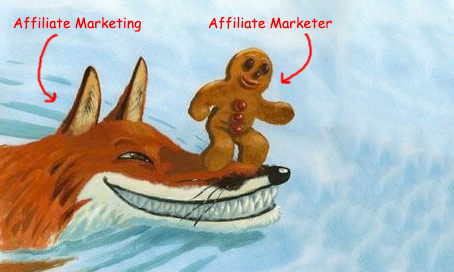About a year ago, I stopped launching affiliate marketing campaigns.
It was an easy decision, despite those campaigns being my primary source of income for the last decade.
As was the decision to quit this blog.
Well, as you can tell, I’m writing this.
Shutting my cakehole wasn’t nearly as sustainable.
Nevertheless, I thought I’d explain why I decided to get out of the CPA business. Maybe some of you can relate.
Why Give Up CPA?
To be clear, when I say that I stopped launching campaigns, I don’t mean that I abandoned affiliate marketing altogether.
I still have several toes and half a bollock in the affiliate industry.
What I gave up was the conventional CPA model of affiliate arbitrage.
That is:
Running ads on Facebook, Exoclick, PopAds, etc… Sending users to a landing page that forces an offer down their throats… Hoping to get paid more in commission than I lose in ad spend.
This model has made me a lot of money over the years.
And don’t get me wrong: it’s still a good model.
But I had several reasons for abandoning affiliate arbitrage:
- Professional stagnation
- Mental stagnation
- Shifting barriers to entry
- Desire to take more ‘ownership’ of my assets
- Increased unwillingness to burn my bridges (and ad accounts)
- Ten fucking years doing affiliate arbitrage
There was another factor.
Can you smell the billowing winds of change?
Or has my dog just farted…
When Affiliates Stop Talking About Affiliate Marketing…
I was listening to a keynote at a recent affiliate conference.
The talk was pitched around how to build your own product, whilst outsourcing the day-to-day management, and living happily ever after.
(Well, cheers mate. I’ll take ten quid’s worth…)
You hear more and more of this, don’t you?
“Build your own product…”
“Be so legit they can’t ban your Ads account…”
“Treat affiliate marketing like any other business…”
“Go work in an office…”
Hmm.
This would have been the prelude to a savage bottling had the speech been given at, say, Affiliate Summit 2008.
But times have changed.
“The difference between thousands of dollars and millions of dollars is building an asset, an ‘actual business’ that can eventually be sold — and what better way to build that business than by leveraging the remarkable powers of affiliate marketers?”
I’m paraphrasing here, but this is the grand takeaway in 2017:
Don’t be an affiliate. Use affiliates.
It’s funny because most of the room appeared to be sat in silent agreement at such an obvious idea.
And yet here we are…
At an ‘affiliate conference’.
Like preaching to the pigs that they’d be wise to move in to selling pork.
Only for the pigs to sharpen their knives with approval.
The industry has changed, clearly, and many affiliates are finding their interests piqued by topics that aren’t so much affiliate marketing, but entire business models we used to proudly avoid.
- Developing products?
- Dropshipping?
- Ecommerce?
- Building a large team?
“The indignity!”
These topics are front and center at affiliate events; they are the talk of the conference; but what’s so strange is how the traditional affiliate models we used to bumrush are falling out of fashion.
Affiliate marketing conferences are starting to look a bit like AA meetings.
Together we flock to celebrate tales of triumph, reform, and lucky escape, courtesy of successful ex-affiliates who still know how to slap together a completely irrelevant PowerPoint about PopCash.
We listen to ex-affiliates and never-been-affiliates drafted in as walking talking case studies to convince us that, yes, we too, can soon work on something that doesn’t involve ‘that thing’ that brought us here.
Namely: affiliate arbitrage.
The words lift us up.
We scribble hasty Evernotes.
“That’s it. I’m getting this shit together. I swear to god I am done hijacking back buttons. I refuse to refresh Voluum until I’ve mastered Shopify and White Hat Facebook™. NOPE.”
Nervously farting at the prospect of new frontiers is the state of affiliate marketing today.
Or, at least… it was for me twelve months ago.
One of those frontiers, a major rising trend in the affiliate space, is something we used to scowl at as the bloated ugly sister of get rich marketing rebills.
It goes to demonstrate the hilariously cyclical nature of our business, because that trend is called E-Commerce.
The Rise of E-Com
How about another flashlight, me old mucker?
If you’ve had your ears pinned to the ground — or simply not up your arse — you will have undoubtedly heard about the sophisticated funnel that has seen items like flashlights and survival kits blitzing every last corner of the social and native web.
While these offers have provided some excellent opportunities for affiliates using traditional arbitrage, they have also opened many eyes to a future after affiliate marketing.
To understand why, you need only look at the single greatest barrier to entry facing affiliates today.
Barrier to Entry: The Cloaking Economy
Generally speaking, arbitrage affiliates need to be cloaking to be competing on the largest platforms.
(The alternative is to be operating at a tremendous scale beyond the scope of most readers.)
No surprises there.
Personally, I don’t like cloaking campaigns.
Over the years, I chose to focus on niches and traffic sources where it wasn’t a prerequisite for profitability.
It’s widely accepted that to run the more ‘traditional’ types of affiliate campaigns successfully on Facebook or Google, you will need to cloak.
Sweeps, adult, casino, dating, anything related to a rebill… good luck running that shit naked, cap’n.
Previously, you didn’t have to cloak on the smaller platforms.
The Tier 2s.
There was enough volume to get profitable through fresh new offers (often unregulated), unsaturated markets, and novel creative angles.
My view is that, while this may still be possible today, the traditional lines of affiliate attack are increasingly leading to attritional bloodbaths — rather than the rampant profiteering that made them desirable in the first place.
If you are not willing to cloak, how do you compete with somebody who does?
Bear in mind, many of the most popular offers are ‘forwarded’ to affiliates precisely because the owners don’t want to get their own hands dirty.
Some affiliates, undeterred, are convinced of a middleground.
A grey hat nirvana.
They’ll ask:
- Isn’t it possible to profit running White Hat campaigns but simply “pushing the envelope” to the edge of compliance?
- Surely there’s a way to run aggressive CPA campaigns on Facebook, profitably, without risking an account ban?
Well, perhaps.
But what are you?
A fucking masochist or something?
This is the famed ‘guideline straddling’ that allows a Facebook rep to speak with a straight face to a room full of CPA affiliates and insist that yes, it really is possible to co-exist on our platform with just the tip of our penis in your arsehole. Be our friends. It’s worth it.
The truth is that not cloaking, for better or worse, increases the barrier to entry of large-scale affiliate marketing success.
And even if you do cloak… you can’t sleep any easier. Your ad accounts can, and probably will, hit the skids eventually.
So, how does this fit in with the rise of E-Com?
Well, as one door closes…
The barrier to entry for launching profitable affiliate campaigns has increased, but the barrier to entry for launching successful products via traditional E-Commerce has decreased.
Affiliates, over the last two years, have found themselves enviously glancing at other industries where the potential for rapid growth is just as big, and the payoff arguably even greater…
Many trends have aligned:
- Platforms like Shopify, Magento, WooCommerce, Teespring and others have brought total convenience to selling online.
- Crowdfunding platforms like Kickstarter, GoFundMe and IndieGoGo have erased entire start-up costs (and cannily allowed entrepreneurs to pass risk on to the consumer).
- Marketplaces like Amazon FBA have opened up insane ready-to-tap economies of scale.
- To top it all, any Tom, Dick or his sister knows how to source cheap products from China.
Whichever way you look, there are companies — start-ups and giants — making it easier than ever to bring tangible products to market on a scale that matches the potential of rapid wealth accumulation associated to affiliate marketing.
Consider some of our biggest pet peeves:
- Caps
- Lack of exclusivity
- No control of the funnel
- Requirement to cloak ads
- No tangible business to sell
- No ability to project long term growth
Who wouldn’t want to sample post-affiliate life?
There is a price, of course.
Many affiliates, including myself, have come to accept (through gritted teeth) that our best efforts can be multiplied exponentially only with the backing of a good product.
The likes of which are seldom found in the CPA space.
Good products.
I know, right?
Affiliate Summit 2008 and they’d be sticking a fork in it.
Good products are the inevitable future of affiliate marketing for anybody who cares about advertising on Facebook, Google, etc.
So, while the affiliate industry of today is becoming harder to penetrate without a competitive edge — such as cloaking — many affiliates are deciding that to commit to a competitive edge, they might as well take ownership of the product itself.
It’s the carrot of more work for a considerably bigger reward.
Of course, an explosion in E-Commerce doesn’t have to come at the expense of affiliate marketing.
As a few gajillion flashlight sales attest.
What’s changing is the incentives for the individual.
Turn back the clock ten years and one of the reasons why we LOVED this industry was because we could try X on Monday, Y on Tuesday and Z on Wednesday. Get rat arsed on Thursday. Sleep on Friday.
It was easy to sling shit at the wall and something would stick.
These days, the big opportunities in affiliate marketing punish such a lackadaisical mindset.
It doesn’t take a genius to see how E-Com is turning so many affiliate heads.
It offers the same flexible terms, minimal risk, and insta-scalability that brought us to affiliate marketing in the first place.
With the added advantage that you can build your own asset.
And share a bed with Facebook Ads.
I expect a slow exodus of arbitrage affiliates as the platforms we love work harder to clamp down on products that customers do not.
Not because of ‘failure’ on the affiliate’s part.
But rather a better payout elsewhere.
Seriously, though…
My decision to step back from this blog, from writing about affiliate marketing, and from actively launching campaigns day-after-day… was rather simple.
I got sick to fucking death of it.
Who wants to be doing CPA forever?
One person, and I’ll tell you his name:
The Gingerbread Man.

He loves flirting with destruction, does the Ginge.
And in affiliate marketing, so do we all.
Which is why I asked myself:
If you don’t want to be doing CPA forever — and you’re successful enough to choose what you do — why the hell are you doing it today?
I did an excellent job of finding acceptable answers to that question over the last decade.
Answers that allowed me to continue focusing on A/B tests, without ever applying such a concept of open-mindedness to my own career.
My tendency to identify as somebody who focused only on CPA — rancid arbitrage and Voluum stats roulette — had become self-limiting.
And it was liberating to finally say:
“Fuck it. This is utter bollocks. What’s next?”
Well…
It’s been a fun year exploring the opportunities beyond affiliate arbitrage.
Successes, failures, wake-up calls and all.
‘What’s next?’ is underrated.
